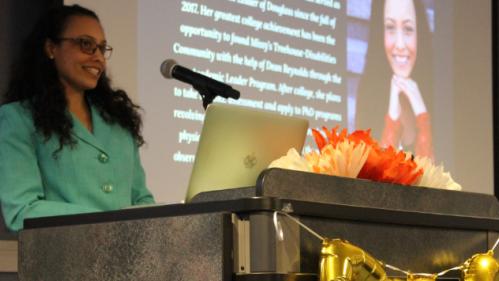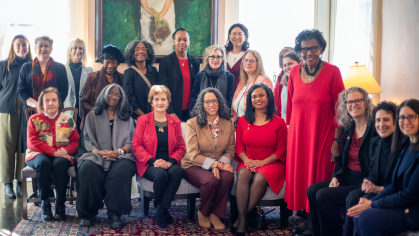At Douglass, there are a number of student advocacy groups dedicated to promoting equality across intersections of identity. When Melissa I. Janney DRC’20, a community nutrition major, decided to take the responsibility of advocacy into her own hands, Missy’s Treehouse Disabilities Community was born.
“I felt compelled to start Missy’s Treehouse because everyone deserves the resources to develop and thrive in their given environment,” said Janney. “The word ‘disabled’ has a historically negative connotation. People are differently abled, and I seek to encourage us as a community to celebrate people of all abilities.”
For Janney, the call to advocate for the Douglass-Rutgers differently-abled community comes from personal experience. As a first-year student, she initially struggled to find the resources she needed to succeed.
“As an individual with a medical condition, it can be very difficult to navigate the campus and perform everyday tasks. I did not know that there were resources available to me and that I was entitled to them by law,” said Janney, “I was fortunate that I had a Resident Assistant and a Peer Academic Leader who helped me take care of myself.”
Based on Janney’s own experiences, Missy’s Treehouse seeks to provide critical resources and legal information to differently-abled students, provide stigma-free social opportunities for the community and their allies, and better educate the university population about issues affecting the community. At Douglass, Missy’s Treehouse quickly found a home.
The group hosts a variety of activities that are accessible for all Douglass students through Rutgers transportation services, so that even those who are unable to drive can attend. Some of the group’s recent social events include a tour of Cook Farm and an open house pizza party. In addition to activities that are primarily recreational, the organization holds events that spark important conversations throughout the Douglass community. For instance, the “Coffee and Controversial Topics” meeting allowed members to voice concerns about issues differently-abled students face during college. The group also hosted an end-of-semester meeting dedicated to sharing mindfulness exercises and coping methods that are valuable to students during finals season.
While the community’s initiatives are integral to fostering a more inclusive environment in university spaces, the organization also focuses on teaching students how to be better allies to differently-abled individuals in their future professional careers.
As with all forms of prejudice, microaggressions towards differently-abled communities often go unnoticed by offenders. For Janney, this is one of the most difficult barriers to overcoming stigma.
“By school age, most people actively express implicit bias to some extent. We learn from observing others, but unlearning is extremely difficult, so it is vital that we come together as a community to spread acceptance and awareness of people of all abilities and backgrounds,” she said. “The benefit to having inclusive spaces on university campuses is the opportunity to learn about other people’s lived experiences and grow from them. The more we know about each other, the less likely we are to jump to conclusions.”



